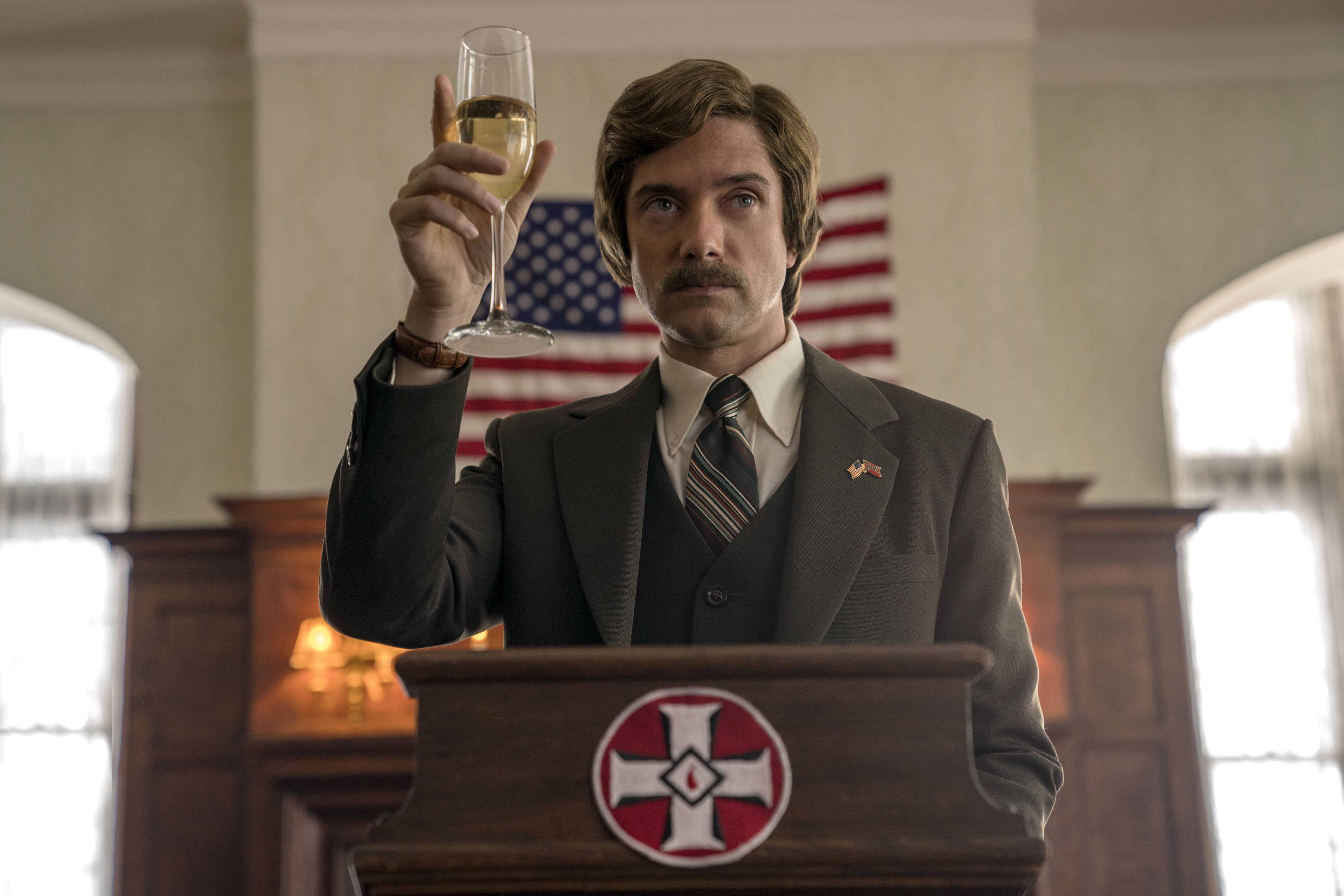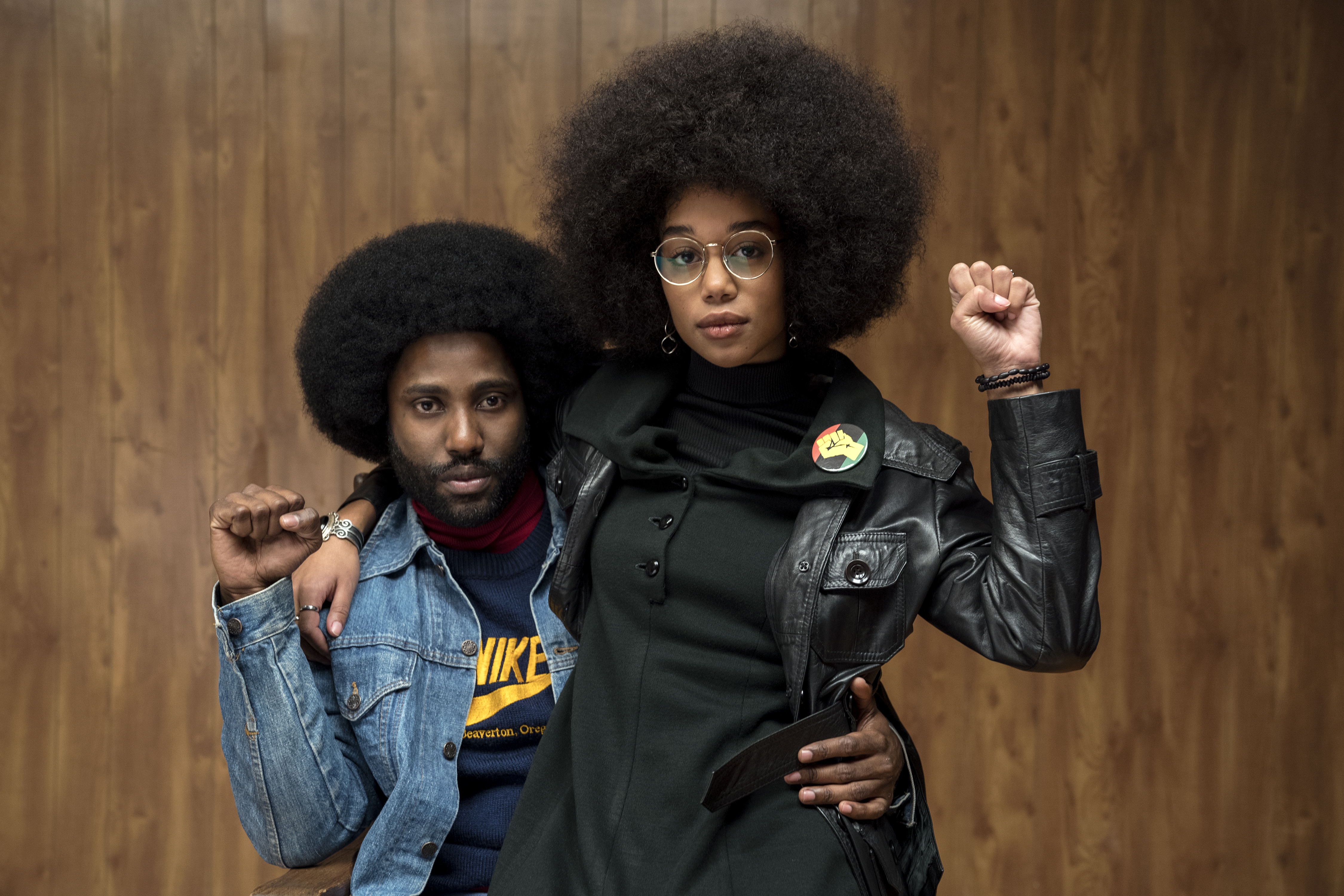MOVIE REVIEWS |
INTERVIEWS |
YOUTUBE |
NEWS
|
EDITORIALS | EVENTS |
AUDIO |
ESSAYS |
ARCHIVES |
CONTACT
|
PHOTOS |
COMING SOON|
EXAMINER.COM FILM ARTICLES
||HOME

.jpg)
Thursday, August 9, 2018
MOVIE REVIEW/BlacKkKlansman
When Chickens Of Hate Come Home To Roost Violently

Toasting hate as Amerikkkan tradition: Topher Grace as David Duke in Spike Lee's
"BlacKkKlansman".
David Lee/Focus Features
by
Omar P.L. Moore/PopcornReel.com
 FOLLOW
FOLLOW
Thursday,
August 9,
2018
Four of the most important scenes in Spike Lee's potent, riveting masterpiece
"BlacKkKlansman" are the first and last two. Somewhere in this brilliant
film (based on seminal African-American Colorado Springs detective Ron
Stallworth's true story of infiltrating the Ku Klux Klan in the 1970s) is "Gone
With The Wind" (1939) and "The Birth Of A Nation" (1915). There's film
vintage of later years: "Foxy Brown" and "Coffy", "Shaft" and " Superfly".
Cinematic culture and political history simmer through "BlacKkKlansman" like
charged chapters along a combustible cultural tightrope that will explode.
Mr. Lee's irrefutable argument, in his best film since "Malcolm X", is that
American culture itself is instrumental, though not solely responsible for the
racist venom, indoctrination, violence and hatred against Black people in
America for centuries. The Klan and American institutional white
supremacy, are the obvious others.
Rookie officer Stallworth (an eye-catching, nuanced John David Washington) leads
an undercover investigation of the Klan after one-too-many menial desk duty
assignments where white fellow cops condescend to and insult him.
Stallworth gets a Jackie Robinson-type induction to Colorado Springs cop ways
before deep-diving into Klan ranks with Stallworth's white Jewish alter ego, the
reluctant Flip (Adam Driver), who faces anti-Semitism from his Klan "friends"
including the notorious Felix (Jasper Paakkonen, magnetic and menacing here),
and a risk of their cover being blown.
Mr. Lee, excellent at atmosphere, boundaries, people and geography in his films
(especially "She's Gotta Have It", "Do The Right Thing", "Jungle Fever", "Summer
Of Sam" and "Chi-raq") is calculating and detailed in the battlefield on
display. You see slogans dotting the homely rural landscape: "America,
love it or leave it!" You see recognizable politicians and their
code-worded dog-whistle campaigns. You hear words like "America First" and
feel the discomfort of the familiar and real.
But Mr. Lee's greatest triumph in "BlacKkKlansman" is what he shows us in quiet
and incendiary moments. A speech by legendary Black activist Kwame Ture
(an electrifying Corey Hawkins), who speaks at a Colorado Springs Black College
Student Union meeting led by Patrice (a pitch-perfect Laura Harrier), is the
film's best scene, supplemented by mesmerizing, powerful cinematography by
Chayse Irvin. "Pick up arms, brother," Ture urges the undercover
Stallworth, forever questioning his own existence in conflicting dual
identities. In quiet reflection a scene between a white woman and her
violent husband chills in its idyllic sunny tenderness -- and coldbloodedness.
The banality of evil. The woman who has an everyday appearance (played
well by Ashlie Atkinson) represents the 53% of white women who voted for Donald
in 2016. Chilling enough.

All power to all the people: John David Washington as Ron Stallworth and
Laura Harrier as Patrice Dumas in Spike Lee's "BlacKkKlansman".
David Lee/Focus Features
The telephonic encounters between Stallworth and David Duke (an amiable Topher
Grace), the grand wizard of the Klan, are often funny though not intentionally
so. Their phone banter symbolizes the fusion of the absurdity of Klan
racist hate and the bizarre specter of a Black male cop undercover as a Klan
insider (hence the way the title of the film is depicted: BlacKkKlansman.)
The director's measured, languid style at times conveys an innocence in the
humanity of these peaceful interactions. These two very different men are
so casual they could actually be brothers. Yet "LOVE" and "HATE",
inscribed so memorably on Radio Raheem's hands in "Do The Right Thing", do
battle once again in "BlacKkKlansman", but for some the fight is often waged
within. This film is about love and hate and the power struggle both
undergo in an attempt to vanquish each other. Mr. Lee's film is also about
an absence of leadership, whether now or in the American past, and what happens
in the void of leadership and responsibility. Sometimes events occurring
under such cratered circumstances solidify and symbolize an oppressive system
rather than challenge it.
Lest I forget -- and "BlacKkKlansman" was an absolutely galvanizing,
unforgettable experience for me -- there are institutional Black pillars in Mr.
Lee's film; timely, educational ones that inspire, that are griots, that are
authentic and life-affirming. Mr. Lee's film is nothing if not a history
lesson, and the director, who loves America deeply and declares his right to
criticize his country here, goes to the screen with an engrossing high-concept
that's as sophisticated and profound as Jordan Peele's Oscar-winning "Get Out"
was. (Mr. Peele produced Mr. Lee's film and initially was tapped to direct
it.)
The most terrifying thing about "BlacKkKlansman" is its depiction of the
devastating institutional authority of white supremacy and dominance, which Mr.
Lee fiercely indicts, be it the Colorado Springs police, the Klan, cinematic
history or political structures. These very real bodies are sometimes
silent yet towering, and a low-angle image of Mr. Grace tilting his head back
slightly during a notable ceremonial is disturbing, an apex of absolute white
racist power and divine exaltation in the actor's innocent, clean-cut babyfaced
boy-next-door look. Such markers however, are but a prelude to what will
be a cold rush of blood to the head and tears to the eyes, tears of sorrow and
indescribable rage.
The terror isn't only in the violence (much of it is spoken here) -- it is also
in the charisma of evil. There's a very charming bespectacled Klan
recruiter Walter (Ryan Eggold) who could be a schoolteacher. (In
2018 a young white woman in Florida taught classes at a middle school and
also did white racist
supremacist podcasts
before finally being expelled.) It would be far too easy for
the director to make cardboard cutouts or caricatures. He's far too wise
to stoop that low. Mr. Lee again resists convention, achieving power and
heightened moments in ordinary everyday faces that look and feel so familiar and
neighborly. Hardly any face, be it a Black or a white one, snarls at us in
this film.
A country club atmosphere in one prolonged scene feels so airy and ordinary it
could be in a place right next to you. That's the point: evil, hate and
vitriol are never far from your door -- if you choose to look at them.
The director asks, what will you do about hate, evil and violence when it hits
you in the face, the gut and the heart? The answer is one to ponder,
especially by the conclusion of this vitally important and timely film. At
the start we see the aftermath of war and at the end we see something
grostequely similar. The question is, how did we get there?
At its earthy and subterranean best "BlacKkKlansman" achieves a
jarring, traumatic effect that ratchets up methodically with superb, well-paced
direction from Mr. Lee, outstanding enough to be a strong contender for next
year's Oscars. Soon you are quite comfortable, relaxed enough to forget
that this real-life story is an entertaining, thought-provoking satire, before
it becomes too viscerally present again. The imagery you see will be very
familiar; taken in isolation the images previously may have appeared relatively
ephemeral, a quick flash of terror. Yet in context after absorption at a
seemingly mundane but crackling 1970s distance, the very same imagery is
altogether newly and plaintively horrific, deeply frightening and traumatic on a
large screen in a darkened theater. What comes is the punch to your gut
that this dangerous current climate has sadly numbed us into oblivion and
exhaustion away from. Thank god Mr. Lee wakes us up from out of our
prolonged nightmarish slumber -- and does he ever.
Also with: Paul Walter Hauser.
"BlacKkKlansman" is rated R by the Motion Picture Association Of America
for language throughout, including racial epithets, and for disurbing/violent
material and some sexual references. The film's running time is two hours
and 15 minutes. The film opens
tonight in the U.S. and Canada before its wide release on Friday.
COPYRIGHT 2018. POPCORNREEL.COM. ALL RIGHTS RESERVED.  FOLLOW
FOLLOW
MOVIE REVIEWS |
INTERVIEWS |
YOUTUBE |
NEWS
|
EDITORIALS | EVENTS |
AUDIO |
ESSAYS |
ARCHIVES |
CONTACT
| PHOTOS |
COMING SOON|
EXAMINER.COM FILM ARTICLES
||HOME
.jpg)

 FOLLOW
TWEET
FOLLOW
TWEET
 FOLLOW
FOLLOW